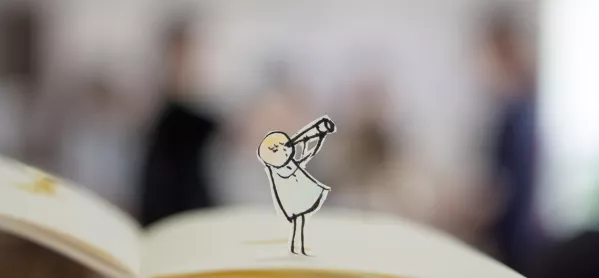- Home
- What would teachers put on their dream curriculum?
What would teachers put on their dream curriculum?

Earlier this year, the chief inspector of Ofsted highlighted the organisation’s commitment to the “real substance of education”, rather than teaching to the test.
Could this be a chance for teachers to hark back to the halcyon days of the 70s, when planning was done on a postage stamp and the seasons dictated what children learned and when?
Maybe, maybe not.
Quick read: ‘Curriculum is important, but it isn’t everything’
Quick listen: GCSEs: what has been the impact of the shift to linear exams?
Want to know more? Meet the teacher who ripped up the curriculum rule book
But, as an optimist, I like to think that perhaps senior and subject leaders could allow staff some input into how the curriculum is taught.
A chance to do that lesson we always dreamed of but which didn’t fit into the scheme of work/policy/proforma.
So, if we were to approach our senior leadership teams, dog-eared notebooks in hand, with our ideas about what the school curriculum could include, what would we say?
I asked fellow teachers for their opinions. This was definitely not a scientific study, but all of my “participants” were from a wide range of school types and subject specialisms. After a while, some themes began to emerge...
Curriculum and cultural enrichment
Cultural capital? Yes, please. Most schools have a space just waiting to be turned into a large-scale mural or decorated with a sculpture. These can look fabulous but need careful planning.
Local art students, or that parent with a hidden talent, can be worth their weight in gold here. I recently saw a fantastic mural when visiting another school which worked in the features of the local area, but I wondered if weaving in influences from the cultures of the children attending the school would enhance the idea.
Right now, for our school, this would include scenes or traditional artwork from Jordan, Israel, Romania, Iraq, France and Nigeria, among others. I’m getting excited just thinking about it.
Real design briefs
Designing real, useful, tangible products has to be better than just a sketch of something that will never be made or used.
Younger children could work out exactly what a certain sports person needs (we recently designed ergonomic water bottles for wheelchair racers), while older children could be asked to work out costings and profits for a product or service.
Teachers here would have the role of facilitating learning rather than guiding, and providing that all-important preparation for future learning and employment. The brief would be audience-focused (what does this person need? How can we make this happen?) and if they can produce and sell it, even better.
Acting in role
What better way to connect learners to the facts than to have them live as key figures? When learning about ancient civilisations, children dressing up as a Roman market traders using reproduction coins would surely absorb more than those merely labelling a diagram?
Could human geography be more fun by becoming a Bedouin tribe and packing supplies and belongings, before migrating to the school field and pitching your very own tent?
Transform the classroom
The very best curriculum themes I have ever seen have taken over a classroom to fully immerse learners in the subject matter. Note the avoidance here of the term “topic” - this suggests something that we learn about then move on from.
One Year 6 colleague I visited had created a full-size air raid shelter in his classroom, complete with wireless and bunk beds. A nice gimmick, some might say.
But later in the year, links were made in learning to the wartime theme which meant children could relate other eras to the war on a timeline, understand the plight of displaced peoples by comparing them to wartime refugees and evacuees, and use what they had learned about persuasive writing and propaganda in other areas.
The learning had stuck; the children made links almost without prompt and acquired skills they would go on to need in the Sats.
As a profession, we do not need teaching how to suck eggs. But this could be a golden opportunity for us to tailor a curriculum around the learners we have in our schools, using methods that we have all probably been using for a long time.
Lucy Moss is a key stage 2 leader in an inner-city primary school
Keep reading for just £1 per month
You've reached your limit of free articles this month. Subscribe for £1 per month for three months and get:
- Unlimited access to all Tes magazine content
- Exclusive subscriber-only stories
- Award-winning email newsletters



